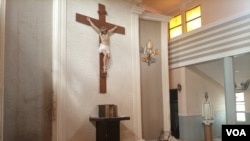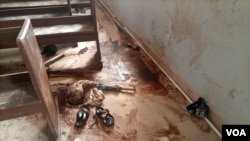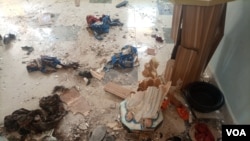Nigerian officials have blamed the terrorist group Islamic State West Africa Province (ISWAP) for an attack on a church in the country's southwest that killed at least 40 people.
Sunday's shooting at St. Francis Catholic Church in Owo was the first linked to ISWAP in Nigeria's southwest, raising fears that terrorism in the country is spreading.
Nigerian Interior Minister Rauf Aregbesola spoke to journalists in Abuja on Thursday, soon after a National Security Council meeting. He said authorities had monitored the situation for days and that "from all indications, they're zeroing in on the Islamic State of West African Province.”
Aregbesola warned Nigerians to be alert but said the attack had no ethnic-religious connections. He also raised concerns about recent killings over allegations of blasphemy in southwest Sokoto state and Abuja.
The church attack was the first time ISWAP, which has carried out many assaults in the northeast and northwest parts of the country, had been blamed for an attack in the southwest.
The region was not one of the areas authorities were worried about until last week. Now, there are concerns that terrorists are expanding their enclaves to new regions.
But Beacon security analyst Kabir Adamu said there were multiple reasons why ISWAP might have carried out the attack.
“There are several factors," Adamu said. "Number one is terrorism, number two is political and then number three, it may be a message being sent to the governor," who has tried to clamp down on marijuana producers. "We were told that Owo is one of the key states where marijuana is produced. A neighboring state, that is Kogi state, has witnessed such attacks, and it's possible that those groups have crossed over into Ondo."
Ondo state authorities said the death toll had risen to at least 40 from Sunday’s attack, with 87 others injured. They said some survivors had been discharged from the hospital.
Armed men detonated explosives and opened fire at the St. Francis Catholic Church in Owo toward the end of the service. Five days later, the street in front of the church is quieter than normal. People hover around the church, chatting in small groups, hoping to get the latest information about the attack.
The resident priest declined to comment on the situation, saying it was affecting his mental health.
A youth leader in Owo, who identified himself as Comrade Olakposan, said local elders were trying to stop youths from carrying out reprisal attacks.
"We feel aggrieved," he said. "The sense of reprisal has been so high in the community since last Sunday, but given the fact that [King] Kabiyesi has been so diplomatic in all to appeal to the community, people, to be calm," there is confidence "that he will do what is just, politically, traditionally and culturally."
In a separate incident, authorities in Nigeria's northwestern Kaduna state said gunmen killed 32 people in an attack Wednesday and razed dozens of houses.
Nigeria is seeing a wave of terrorist attacks and kidnappings a year ahead of presidential elections, and crime is certain to be a major issue in the campaign. President Muhammadu Buhari, who vowed to focus on security when first elected in 2015, is constitutionally barred from seeking another term.






